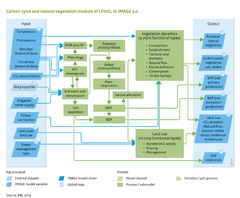Carbon cycle and natural vegetation: Difference between revisions
Jump to navigation
Jump to search
No edit summary |
No edit summary |
||
| Line 11: | Line 11: | ||
The CO2 uptake by and release from the terrestrial biosphere is determined by a number of processes that are sensitive to environmental conditions, such as climate, atmospheric CO2 concentration and moisture. Hence, even if land cover and land use would remain unchanged, the strength of the current net sink may change, over time, in response to changes in those conditions. Basic processes include photosynthesis, plant and soil respiration, transpiration, carbon allocation and turnover, and disturbances, such as fires. Photosynthesis is the process where CO2 is taken up from the atmosphere and converted into organic carbon compounds. This conversion of CO2 is called gross primary production ([[HasAcronym::GPP]]). The sequestered carbon is partially needed for plant maintenance and growth (autotrophic respiration), while the remainder (net primary production NPP) is incorporated in new tissues in various parts of plants, forming live biomass carbon pools. The ultimate fate of these plant parts (incl. leaf fall and mortality) cause the stored carbon to be transferred to various carbon pools, such as the soil and the atmosphere. From the soil pools, through processes of mineralisation, CO2 is also emitted back into the atmosphere. | The CO2 uptake by and release from the terrestrial biosphere is determined by a number of processes that are sensitive to environmental conditions, such as climate, atmospheric CO2 concentration and moisture. Hence, even if land cover and land use would remain unchanged, the strength of the current net sink may change, over time, in response to changes in those conditions. Basic processes include photosynthesis, plant and soil respiration, transpiration, carbon allocation and turnover, and disturbances, such as fires. Photosynthesis is the process where CO2 is taken up from the atmosphere and converted into organic carbon compounds. This conversion of CO2 is called gross primary production ([[HasAcronym::GPP]]). The sequestered carbon is partially needed for plant maintenance and growth (autotrophic respiration), while the remainder (net primary production NPP) is incorporated in new tissues in various parts of plants, forming live biomass carbon pools. The ultimate fate of these plant parts (incl. leaf fall and mortality) cause the stored carbon to be transferred to various carbon pools, such as the soil and the atmosphere. From the soil pools, through processes of mineralisation, CO2 is also emitted back into the atmosphere. | ||
Terrestrial carbon-cycle and vegetation models contribute to a better understanding of the dynamics of the terrestrial biosphere related to the underlying processes and their relation to the terrestrial water cycle (see Section 6.3) and land use (see [[Agricultural economy and forestry]]). The [[LPJmL model]] (Sitch et al., 2003; Gerten et al., 2004; Bondeau et al., 2007) replaces the earlier IMAGE-2 carbon cycle and biome model (Klein Goldewijk et al., 1994; Van Minnen et al., 2000). Here, we give a general overview of the LPJmL model in the IMAGE context, with a focus on carbon and biome dynamics. For a detailed description of the IMAGE-LPJ C cycle model and a sensitivity analysis, see (Müller et al., 2013<ref>[[ | Terrestrial carbon-cycle and vegetation models contribute to a better understanding of the dynamics of the terrestrial biosphere related to the underlying processes and their relation to the terrestrial water cycle (see Section 6.3) and land use (see [[Agricultural economy and forestry]]). The [[LPJmL model]] (Sitch et al., 2003; Gerten et al., 2004; Bondeau et al., 2007) replaces the earlier IMAGE-2 carbon cycle and biome model (Klein Goldewijk et al., 1994; Van Minnen et al., 2000). Here, we give a general overview of the LPJmL model in the IMAGE context, with a focus on carbon and biome dynamics. For a detailed description of the IMAGE-LPJ C cycle model and a sensitivity analysis, see (Müller et al., 2013<ref>[[Müller et al.,b (unpublished)]]</ref>). | ||
Müller et al.,b (unpublished)]]</ref>). | |||
<references/> | <references/> | ||
}} | }} | ||
[[HasOutputVar::Terrestrial C balance| ]] | [[HasOutputVar::Terrestrial C balance| ]] | ||
Revision as of 15:26, 10 December 2013
Parts of Carbon cycle and natural vegetation
| Component is implemented in: |
|
| Related IMAGE components |
| Models/Databases |
| Key publications |
| References |
Key policy issues
- What is the role of the terrestrial biosphere in the global carbon cycle, how will it change in time as a result of climate and land-use change?
- To what extent can the terrestrial biosphere contribute to reducing the accumulation of CO2 in the atmosphere and what are viable mechanisms?
- What opportunities exist to reduce land-use related carbon emissions (e.g. REDD) and even enhance the carbon uptake through the establishment of new forests.
- What are the contributions of land-use change, climate change and CO2 fertilization on the future carbon cycle and how can these be considered in climate policies?
Introduction
